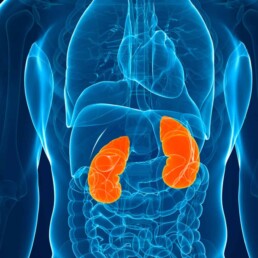In this blog we will discuss the role of dietary acid load on the progression of chronic kidney disease. But before we start let us talk about about blood acidity and how it is linked to our diet and how the body maintain it.
Blood acidity is strictly regulated in our body by intricate mechanisms that help maintain a range that is compatible with life. It is measured by what is called pH. The pH is technically a measure of hydrogen ion concentration. This term was utilized because hydrogen concentration is very miniscule and has been difficult to measure.
Maintaining blood acidity or pH level in a certain range is important for many minerals in our body to act properly and for the optimal function of many enzymes and hormones. Consuming the standard American diet (SAD diet) leads to the production of acid in the bloodstream due to metabolism of protein and other food elements, as seen in the figure below.
It is estimated that on average each person produces 1-1.5 mmoles of blood acid (hydrogen ion) for every kilogram of body weight per day. The acid produced by the metabolism is “buffered” by circulating alkali in the blood that is mainly produced by the kidneys. It is also buffered by our bones and by our muscles to some degree. The kidneys and lungs play a crucial role in maintaining blood acidity in the normal range.
Consuming a diet high in animal proteins that contains organic sulfur, cheese, eggs, and grains leads to the production of excessive amounts of blood acid that put an extra burden on the kidneys to excrete it. While consuming a diet high in fruits and vegetables produces blood alkali and has an opposite effect.
There are many ways to estimate the amount of acid produced by the diet. A good dietitian can easily make an estimate, but there are urinary tests that can help with getting a relatively accurate estimation.
In a study published in 2001, it was found that adding 4-5 additional servings of fruits and vegetables a day to the SAD diet can decrease acid load on the kidneys, without excessively restricting dietary protein.
Increased blood acidity has been found in the earliest stage of kidney disease. In fact, decreased handling of acid load was detected in as early as stage II kidney disease.
Increasing blood acidity has also been associated with a faster progression of kidney disease and correcting that with bicarbonate (an alkali) has been found to slow down the progression without significant side effects. In addition, accumulation of blood acid can lead to muscle wasting as the muscle proteins are used as buffer and also leads to bone resorption and osteoporosis. Supplementing elderlies with bicarbonate leads to increased strength and bone health.
Therefore, alkali therapy by sodium bicarbonate, potassium citrate, or simply taking baking soda has a positive protective effect on the kidneys and on the body in general. The same effect can also be achieved by limiting animal protein and processed food intake and increasing the intake of fruit and vegetables.
We recommend that a patient with kidney disease (and probably the general population) should limit the intake of animal protein, and add an additional 4-5 servings a day of fruit and vegetables (those on potassium restrictions should avoid these fruits and vegetables). We also recommend taking a quarter tea spoon of baking soda with a drink of choice twice a day. Each teaspoon of baking soda has 60 mmoles of bicarbonate which is much higher than any pharmaceutical tablet available at this time. Don’t forget to consult your Functional or Integrative medicine provider or nephrologist.




